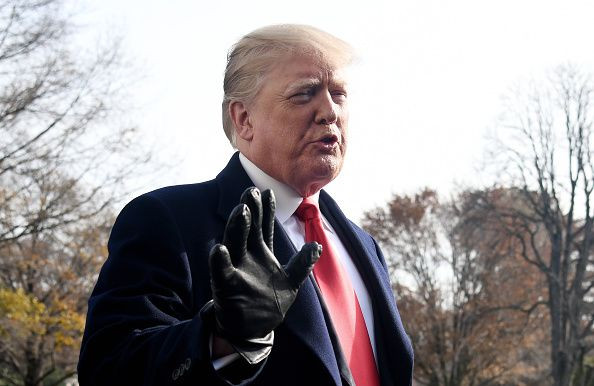Will Donald Trump Resign? Conservative Pundit Predicts Last 10 Minutes Of Term Will Include Resignation, Pardon

Washington Post pundit Jennifer Rubin has been among the most vocal conservative writers to criticize Donald Trump, and on Sunday she made a bombshell prediction about the conclusion of Trump's presidency.
"[Trump] risks being prosecuted after he leaves office," Rubin said in a panel discussion on the MSNBC program AM Joy. "For that very reason — I would predict here on MSNBC — that when Trump leaves office, he will resign the presidency 10 minutes before Mike Pence leaves office, allowing Pence to pardon him if there is not a Republican president to follow him."
Rubin's theory seems to be based on the perception that a sitting president cannot be indicted. Also, Rubin may believe that Trump could be accused of other potentially offenses by special counsel Robert Mueller III or the Southern District of New York but won't be removed from office by Congress through impeachment. Her comments also suggest that Pence would, in fact, pardon Trump.
The Department of Justice could still indict Trump once he leaves office, making a possible presidential pardon from Pence extremely important to Trump.
Speculation about a Trump indictment has gained traction in recent days following Friday's court filings from federal prosecutors in the Southern District of New York that Trump's former personal lawyer Michael Cohen acted "in coordination with and at the direction of" Trump when making illegal hush money payments to two women during the 2016 presidential campaign.
"There's a very real prospect that on the day Donald Trump leaves office the Justice Department may indict him, that he may be the first president in quite some time to face the real prospect of jail time," said Rep. Adam Schiff on CBS' "Face the Nation."
"We have been discussing the issue of pardons that the president may offer to people or dangle in front of people. The bigger pardon question may come down the road as the next president has to determine whether to pardon Donald Trump."
However, Trump has not been charged with a crime and can avoid indictment if prosecutors can't prove he had criminal intent and willfully violated the law.
Some believe that Trump's possible federal campaign finance violations are enough to begin impeachment proceedings, though some Democratic lawmakers feel that might be premature.
"You don't necessarily launch an impeachment against the president because he committed an impeachable offense," Rep. Jerry Nadler, the incoming chairman of the House Judiciary Committee, said on Sunday.
"There are several things you have to look at. One, were there impeachable offenses committed? How many? And secondly, how important were they? Did they rise to the gravity where you should undertake an impeachment?" Nadler asked. "An impeachment is an attempt to affect or overturn the result of the last election, and [Congress] should do it only for very serious situations."
There has long been debate as to whether a sitting president can be indicted and also if impeachment will ultimately remove a president from office. Andrew Johnson, the 17th president, and Bill Clinton, the 42nd president, were both impeached by the House but acquitted by the Senate. Richard Nixon resigned in 1974 amid looming calls for impeachment and was later pardoned by Gerald Ford. The Democrats will gain control of the House in January but Republicans have the majority in the Senate, and there needs to be 67 Senate votes for impeachment.
Trump, meanwhile, may face more than just federal campaign finance violations. The special counsel is investigating whether Trump and those within his presidential campaign conspired with Russia, which would be a federal crime.
The investigation could also mean that Trump comes under heavy scrutiny for his business and personal activities.
His foreign business relations — particularly with Russia — present one of the biggest issues. Cohen's guilty plea revealed that weeks after Trump had secured the Republican nomination, he had multiple discussions with Trump and others in Trump's family about a Trump Tower Moscow and was pursuing a deal.
Article I, Section 9, Clause 8 of the constitution clearly states that "… no person holding any Office of Profit or Trust under [the United States], shall, without the Consent of the Congress, accept of any present, Emolument, Office or Title of any kind whatever, from any King, Prince or foreign State."
Rubin’s remarks are just the latest prognostications about the many possible scenarios for Trump and his family amid the Mueller probe. In July, Rep. Steve Cohen of Tennessee predicted "that it is entirely possible" that Donald Trump Jr. and Jared Kushner would both be indicted by the special counsel's office.
A frequent guest on cable news, Rubin is mostly known for her "Right Turn" blog in the Washington Post. She has been published in a variety of news outlets including Politico, the New York Post, the Weekly Standard, National Review and the Jerusalem Post.
© Copyright IBTimes 2024. All rights reserved.





















